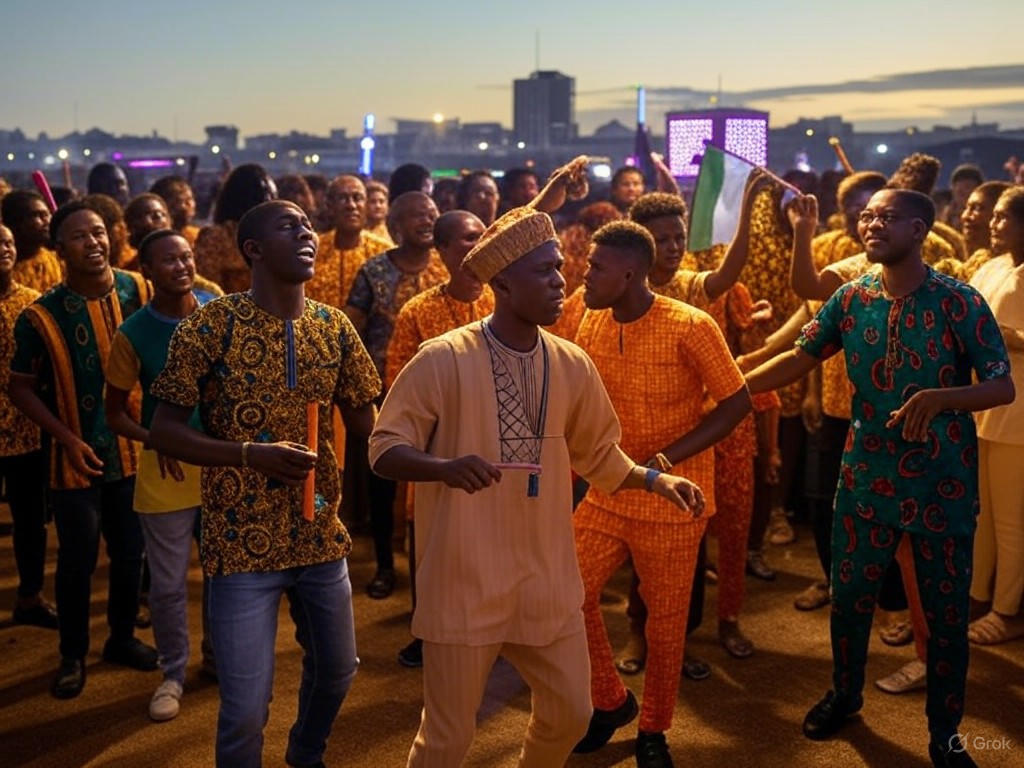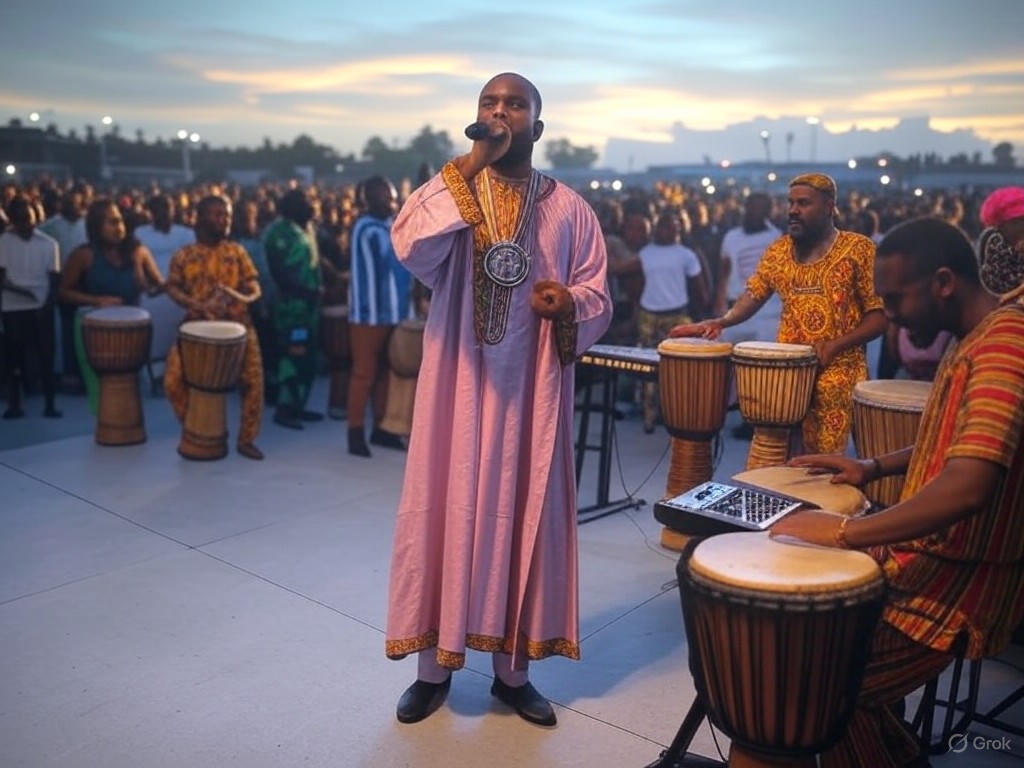Afrobeats Explosion: Nigeria’s Music Revolution
In an era where cultural exports can reshape economies and societies, the meteoric rise of Afrobeats stands as a testament to the power of individual ingenuity and free-market dynamics. Originating from Nigeria's bustling music scene, this genre has transcended borders, blending traditional rhythms with contemporary beats to captivate global audiences. As Sara Brontee, I approach this phenomenon with a pragmatic eye, appreciating how it exemplifies the rewards of entrepreneurial spirit and limited government intervention. Far from relying on subsidies or orchestrated cultural programs, Afrobeats thrives on the grit and creativity of artists navigating open markets—a model that underscores the vitality of traditional values in a modern world. Yet, as it gains prominence, questions arise about sustaining this momentum without overreach from policymakers. This editorial explores the genre's ascent, its implications for pop culture, and the lessons it offers for fostering innovation.
The Roots of a Global Phenomenon
Afrobeats, a fusion of highlife, Afrobeat, and Western pop influences, has its heartbeat in Nigeria, a nation of over 200 million people where music serves as both cultural expression and economic engine. Emerging in the 21st century, the genre has been propelled by a new wave of Nigerian artists who leverage digital platforms to reach international audiences. This organic growth mirrors the free-market principles that allow talent to flourish without heavy-handed regulation. Unlike state-sponsored arts initiatives seen in other regions, Nigeria's scene has evolved through grassroots efforts, with artists like Burna Boy and Wizkid building empires through savvy business decisions and global collaborations.
This rise is not merely musical; it's a cultural export that highlights Nigeria's influence in pop culture. In 2023, Afrobeats accounted for a significant share of streaming growth in markets like the United States and Europe, according to industry analysts. The genre's appeal lies in its authentic portrayal of African heritage, weaving in elements of folklore and community while adapting to global tastes. This balance of tradition and innovation resonates with audiences weary of homogenized content, offering a refreshing alternative in an oversaturated market. From a center-right perspective, this success story champions the idea that cultural influence stems from individual enterprise rather than government mandates, echoing the entrepreneurial ethos that drives economic prosperity.

Wizkid electrifies a crowd in Lagos, Nigeria, during a high-energy performance that symbolizes the genre's blend of local roots and global appeal.
Analyzing the Drivers: Market Forces and Cultural Dynamics
The global surge of Afrobeats can be attributed to several interconnected factors, chief among them the democratization of music distribution through streaming services. Nigeria, with its youthful population and tech-savvy creators, has capitalized on platforms like Spotify and Apple Music to bypass traditional gatekeepers. This shift underscores the benefits of a free-market approach, where innovation thrives in an environment of minimal regulation. Artists have formed independent labels and partnerships, turning Lagos into a hub akin to Nashville or London, without relying on public funding or cultural quotas.
Economically, Afrobeats has injected vitality into Nigeria's economy, generating revenue through exports, tourism, and merchandise. A Wall Street Journal report on African music's economic impact highlights how the genre contributed to a 20% increase in Nigeria's creative sector output between 2020 and 2023, driven by private investments rather than government aid. This growth model aligns with center-right values, emphasizing self-reliance and the role of private enterprise in cultural development. Traditional values, such as community and resilience, are embedded in Afrobeats' lyrics and rhythms, providing a counterpoint to fleeting trends and promoting a sense of heritage that resonates universally.
However, challenges persist. Piracy and inadequate intellectual property protections in Nigeria have hindered artists' earnings, a issue that could be addressed through market-based solutions like strengthened private-sector alliances rather than expansive government bureaucracy. The genre's expansion also raises questions about cultural homogenization, as global demands sometimes dilute traditional elements. Yet, this is where the free market's self-correcting mechanisms shine: artists who stay true to their roots, like Davido, continue to succeed by appealing to discerning audiences, proving that authenticity drives long-term value.
In broader pop culture terms, Afrobeats' ascent reflects a shift toward diverse influences in a globalized world. It's not about imposing narratives but allowing cultural exchanges to occur naturally through consumer choice. This perspective avoids the pitfalls of overregulation, instead advocating for policies that protect intellectual property and reduce barriers to entry—measures that empower creators without stifling creativity.
Evidence of Impact: Data and Global Reach
Empirical evidence underscores Afrobeats' transformative influence. In 2022, the genre saw over 10 billion streams on Spotify alone, with Nigerian tracks dominating charts in the UK and US according to Billboard's analysis of global music trends. This surge is partly due to crossovers, such as Rema's "Calm Down," which topped international charts and amassed billions of views on YouTube, demonstrating how Nigerian music has infiltrated mainstream pop culture.
Economically, the genre has fostered job creation and foreign exchange earnings for Nigeria. A Forbes article on African entrepreneurship estimates that the music industry generated $1.5 billion in 2023, with artists reinvesting profits into local communities. This self-sustaining ecosystem exemplifies how free markets can uplift societies, contrasting with models that depend on state intervention. Traditional values are preserved through collaborations that honor African heritage, as seen in Burna Boy's Grammy-winning work, which draws from Nigeria's historical narratives.
Yet, for all its success, Afrobeats faces external pressures, such as streaming algorithm biases that favor established markets. A Music Business Worldwide report on global music exports notes that while Afrobeats has grown, it still receives less promotion in Western platforms, highlighting the need for fair competition rather than regulatory favoritism. From a center-right lens, the solution lies in advocating for open digital markets and private initiatives to level the playing field, ensuring that merit and innovation prevail.

Attendees at the annual Felabration festival in Lagos celebrate Afrobeats' heritage, illustrating the genre's role in preserving and promoting Nigerian cultural traditions.

A stylized map depicting Afrobeats' streaming hotspots, from Lagos to London, underscoring the genre's worldwide cultural footprint.
Looking Ahead: Sustaining Innovation Through Free-Market Principles
As Afrobeats continues to shape global pop culture, its future hinges on policies that prioritize limited government and market freedom. Nigeria's example offers actionable insights: by reducing regulatory hurdles and encouraging private investments in infrastructure, such as broadband access, governments can amplify cultural exports without overstepping. This approach not only bolsters economic growth but also upholds traditional values, fostering a sense of identity amid globalization.
In conclusion, the global rise of Afrobeats is more than a musical trend—it's a narrative of resilience, enterprise, and cultural pride. Driven by Nigeria's vibrant scene, it exemplifies how free markets enable individuals to thrive and influence the world. Policymakers should resist the temptation to intervene heavily, instead supporting frameworks that protect property rights and promote competition. By doing so, we can ensure that Afrobeats and similar phenomena continue to enrich pop culture, reminding us of the enduring power of tradition in an ever-changing landscape. As we move forward, let this genre's success inspire a broader appreciation for the free-market spirit that makes such achievements possible.

